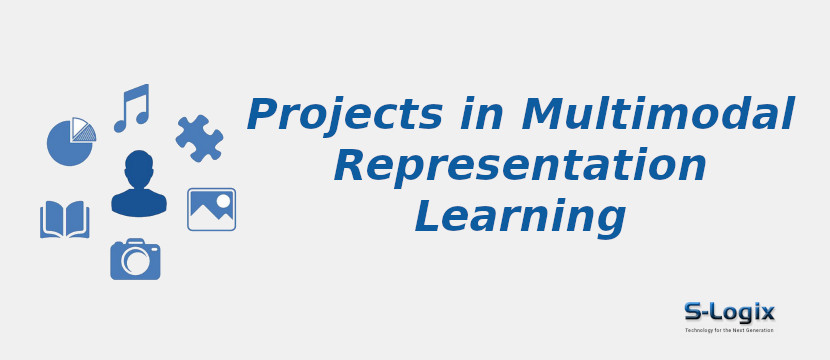Project Background:
Multimodal representation learning arises from the need to effectively capture and understand complex relationships within heterogeneous data sources and other modalities. In the era of big data, diverse types of information are generated and shared across various platforms, making it essential to develop comprehensive models capable of extracting meaningful representations from multimodal inputs. Traditional unimodal approaches often fail to capture the richness and interconnectedness of multimodal data. This work addresses limitations by leveraging advanced representation learning techniques to discern intricate patterns and correlations across different modalities. This work seeks to create a shared representation space where information from various modalities can be fused and integrated seamlessly by employing methods such as deep neural networks, unsupervised learning, and transfer learning. This shared representation facilitates a deeper understanding of the underlying structure in the data, allowing for more robust and versatile applications, including multimodal retrieval, classification, and generation.
Problem Statement
- Multimodal representation learning revolves around the challenges associated with effectively capturing and leveraging the rich information present in diverse modalities to build meaningful and cohesive representations.
-
This project addresses issues such as heterogeneity in data distributions across modalities and the intricate relationships between different data types.
-
Challenges also arise in devising methods for aligning and fusing information from disparate modalities, ensuring that the learned representations effectively capture synergies between them.
-
Moreover, it seeks to overcome the limitations posed by limited labeled multimodal datasets, requiring robust unsupervised or weakly supervised approaches to learn representations without extensive labeled samples.
-
The overarching problem is developing multimodal representation learning models that generalize well across diverse datasets and tasks, offering a shared, cohesive space efficiently encoded for downstream applications.
Aim and Objectives
- Enhance the effectiveness of representation learning by developing robust models capable of capturing and leveraging information from diverse modalities in a shared representation space.
-
Develop methods for seamlessly integrating and aligning data from different modalities.
-
Explore techniques to capture both intra-modal and inter-modal correlations within the data.
-
Investigate unsupervised or weakly supervised approaches to learn representations without extensive labeled data.
-
Design models capable of encoding information at varying levels of granularity across modalities.
-
Develop representations that generalize across diverse datasets and apply to various downstream tasks.
-
Implement efficient fusion mechanisms to combine information from different modalities meaningfully.
-
Ensure scalability of multimodal representation learning models to handle large and complex datasets.
-
Facilitate using learned representations for various applications, including retrieval, classification, and generation tasks.
Contributions to Multimodal Representation Learning
1. Developing novel techniques for efficient fusion of information from diverse modalities, contributing to improved representation learning.
2.
Addressing the challenges, seamlessly integrating and aligning heterogeneous data sources by enhancing the robustness of multimodal representations.
3.
Contributing to the field by advancing robust, unsupervised, weakly supervised approaches for learning representations without extensive labeled data.
4.
Designing models capable of encoding information at varying levels of granularity across modalities, leading to more nuanced and detailed representations.
5.
Developing representations demonstrating strong generalization across diverse datasets and tasks, fostering application versatility.
6.
Enabling the use of learned representations for various applications, including retrieval classification, showcasing the versatility of multimodal representations.
7.
Contributing to the development of scalable multimodal representation learning models capable of handling large and complex datasets.
Deep Learning Algorithms for Multimodal Representation Learning
- Multimodal Neural Networks
-
Cross-Modal Embeddings
-
Graph Neural Networks for Multimodal Data
-
Deep Canonical Correlation Analysis
-
Multimodal Variational Autoencoders
-
Joint Embedding Networks
-
Deep Cross-Modal Retrieval Models
-
Attention Mechanisms for Multimodal Fusion
-
Transformers for Multimodal Representation Learning
Datasets for Multimodal Representation Learning
- MSCOCO - Microsoft Common Objects in Context
-
COCO Captions - Image Captioning Dataset
-
ImageNet - Large-Scale Image Database
-
Flickr30k - Image Captioning Dataset
-
AudioSet - Large-scale dataset of audio events
-
IEMOCAP - Multimodal Emotion Recognition Dataset
-
CMU-MOSEI - Multimodal Sentiment Analysis Dataset
-
AVA - Atomic Visual Actions Dataset
-
MPII Movie Description - Multimodal Movie Summarization Dataset
-
YouTube-8M - Large-Scale Video Understanding Dataset
Performance Metrics
- Modality Alignment Score
-
Cross-Modal Retrieval Accuracy
-
Intra-Modal Similarity
-
Inter-Modal Similarity
-
Embedding Space Visualization Quality
-
Transfer Learning Effectiveness
-
Generalization to Unseen Modalities
-
Robustness to Noisy Data
-
Efficiency in Resource Utilization
-
Scalability
-
Adaptability to Diverse Data Distributions
Software Tools and Technologies
Operating System: Ubuntu 18.04 LTS 64bit / Windows 10
Development Tools: Anaconda3, Spyder 5.0, Jupyter Notebook
Language Version: Python 3.9
Python Libraries:
1. Python ML Libraries:
- Scikit-Learn
- Numpy
- Pandas
- Matplotlib
- Seaborn
- Docker
- MLflow
2. Deep Learning Frameworks:
- Keras
- TensorFlow
- PyTorch
